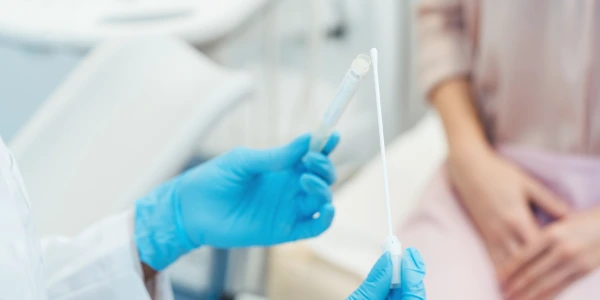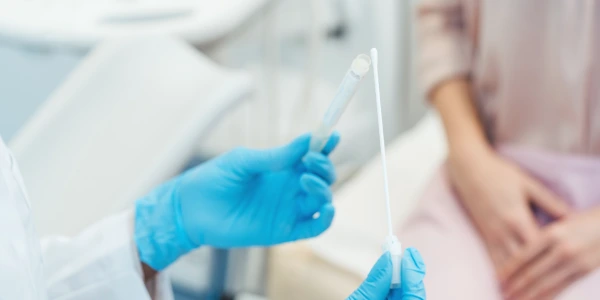Introduction
Gynecological cancers affect thousands of women in India each year, yet awareness about prevention, early detection, and treatment options remains surprisingly low. These cancers, which affect the female reproductive system, Could result in severe issues if left unnoticed and managed promptly. However, with proper knowledge and preventive measures, women may reduce the likelihood of complications and lead to better outcomes.

Dr. Anita Singla, a renowned women’s health specialist at AVEE Hospital Vaishali Sector 6, emphasizes that education is the first step toward prevention. “Many women come to me with advanced gynecological cancers that could have been detected earlier if they had known the warning signs or undergone regular screenings,” she notes. As the best gynaecologist in Ghaziabad, Dr. Singla has committed her career to increasing awareness of gynecological health and cancer prevention.
This comprehensive guide outlines five essential things every woman should know about gynecological cancer and prevention, providing valuable insights that could potentially save lives. Whether you’re in your 20s or post-menopause, this information is crucial for protecting your reproductive health.
1. Understanding Different Types of Gynecological Cancers
Gynecological cancer prevention begins with understanding the Several Cancer types that can originate in the female reproductive system. According to the American Cancer Society’s 2025 report, there are six main types of gynecological cancers, each with distinct characteristics and risk factors.
Cervical Cancer
The onset of cervical cancer occurs in the cervix, which is the lower section of the uterus forms the lower portion of the uterus and joins it to the vagina. This is one of the most preventable types of gynecological cancers due to effective screening tests and the HPV vaccine. Routine Pap smears help identify precancerous changes in cervical cells before they develop into cancer.
Ovarian Cancer
The ovaries are key female reproductive organs that produce eggs and hormones producing eggs, are where ovarian cancer originates and hormones. This type is often called the “silent killer” because symptoms typically don’t appear until the disease has advanced. Effective gynecological cancer prevention for ovarian cancer includes knowing your family history and recognizing subtle symptoms like bloating, pelvic pain, and feeling full quickly.
Endometrial Cancer
Uterine cancer, also called endometrial cancer, begins in the lining of the uterus (endometrium). It’s the most common gynecological cancer in India, with increasing rates among younger women. Risk factors include obesity, diabetes, and hormonal imbalances.
Other Gynecological Cancers
Vaginal, vulvar, and fallopian tube cancers are less common but equally important to understand. Each has unique risk factors and symptoms that women should be aware of to ensure early detection.
At AVEE Hospital, one of the best hospitals in NCR, Dr. Singla provides comprehensive education about these different cancer types, helping women understand their specific risks and prevention strategies.
2. Know Your Risk Factors
Being aware of your specific risk factors plays a vital role in effective gynecological cancer prevention. While some risk factors cannot be changed, awareness allows for more vigilant monitoring and early intervention.
Genetic and Family History
Approximately 20% of ovarian cancers are linked to Hereditary mutations, notably those affecting the BRCA1 and BRCA2 genes. Women with a family history of ovarian, breast, uterine, or colorectal cancer have elevated risk levels and might consider genetic testing and counseling.
“Knowing your family history is one of the most powerful tools for gynecological cancer prevention,” explains Dr. Singla, recognized as the best gynaecologist in Ghaziabad for her expertise in hereditary cancer syndromes. “If multiple family members have had cancer, especially at younger ages, genetic testing might be recommended.”
Age and Demographic Factors
The risk of most gynecological cancers increases with age, with the highest incidence occurring in women aged 55-64. The median age at diagnosis is 63. However, certain types, like cervical cancer, can affect younger women as well.
Research also shows concerning racial disparities in survival rates, with some populations experiencing poorer outcomes Because of multiple factors such as healthcare access and early detection services.
Reproductive and Hormonal Factors
Several reproductive factors can influence cancer risk:
- Early menstruation (before age 12)
- Late menopause (after age 55)
- Never having children (nulliparity)
- Not breastfeeding
- Long-term use of hormone replacement therapy
Lifestyle Factors
Certain lifestyle choices can significantly impact your risk of developing gynecological cancers:
- Obesity increases the risk of several gynecological cancers, particularly endometrial cancer
- There is a connection between smoking and an elevated risk of cervical cancer
- Inactive lifestyle and insufficient physical exercise
- Poor diet low in fruits and vegetables
- Excessive alcohol consumption
AVEE Hospital, a top cancer care hospital in Ghaziabad, offers comprehensive risk assessment services to help women understand their personal risk profile and develop tailored prevention strategies.
3. Prevention Strategies That Work
Effective gynecological cancer prevention involves a combination of medical interventions, lifestyle modifications, and regular screenings. Adopting these strategies can greatly lower your risk of developing gynecological cancers.
Medical Interventions
Several medical approaches have proven effective in reducing gynecological cancer risk:
- HPV Vaccination: The HPV vaccine protects against The strains of human papillomavirus responsible for the majority of cervical cancers. Ideally administered before sexual activity begins, this vaccine is recommended for girls and young women between ages 9 and 26, though it can benefit older women as well.
- Birth Control Pills: Using oral contraceptives for a duration of five or more years can reduce ovarian cancer risk by approximately 50%. This protective effect can persist for decades after discontinuation.
- Preventive Surgery: For women at very high risk due to genetic mutations, preventive Removal of the ovaries and fallopian tubes through surgery might be advised after completing childbearing.
“Understanding how to prevent gynecological problems through medical interventions is crucial, especially for high-risk women,” notes Dr. Singla. As the best gynaecologist in Ghaziabad, she provides personalized recommendations based on each patient’s risk profile.
Lifestyle Modifications
Small adjustments in lifestyle can greatly help in lowering cancer risk:
- Keep a healthy weight: Obesity has been associated with several gynecological cancers, particularly endometrial cancer. Attaining and sustaining a healthy weight by following a balanced diet and making regular physical activity part of your daily habits regularly can help reduce balanced diet and regular exercise can lower risk.
- pls rewrite this moderate exercise or 75 minutes of intense activity each week. Being physically active aids in balancing hormone levels and strengthens the immune system.
- Balanced Nutrition: Make sure to add a wide variety of fruits and vegetables for your meals, whole grains, and lean proteins. Limit processed foods, red meat, and sugar. Certain studies propose that consuming foods high in antioxidants could help prevent cellular damage that can lead to cancer.
- Reduce Alcohol Consumption: Excessive drinking has been linked to increased cancer risk. If you drink, do so in moderation.
- Avoid Tobacco: Smoking increases the risk of several cancers, including cervical cancer. If you smoke, seek support to quit.
AVEE Hospital provides comprehensive lifestyle counseling and support programs to help women implement these important changes. With state-of-the-art ICU services in Vaishali, Ghaziabad, the Patients at the hospital receive care of the utmost standard at every stage of their health journey.
4. Recognizing Early Warning Signs
Gynecological cancer awareness includes knowing the warning signs that should prompt a medical consultation. Early detection significantly improves treatment outcomes, making symptom recognition a crucial aspect of women’s health.
Common Symptoms Across Different Gynecological Cancers
While each type of gynecological cancer has specific symptoms, some warning signs are common across multiple types:
- Abnormal Vaginal Bleeding: Bleeding between periods, after menopause, or after sexual intercourse
- Pelvic Pain or Pressure: Persistent pain or pressure in the pelvic region
- Abdominal or Back Pain: Unexplained pain that persists
- Changes in Bathroom Habits: Increased urinary frequency, constipation, or diarrhea that doesn’t resolve
- Bloating: Persistent bloating that doesn’t fluctuate with your menstrual cycle
- Changes in Vulvar Skin: Itching, burning, rash, or changes in skin color
- Unusual Vaginal Discharge: Changes in amount, color, or odor
“Many gynecologic cancer symptoms can be subtle and easily attributed to other conditions,” explains Dr. Singla. “That’s why Monitoring your body closely and consulting a doctor if symptoms continue is essential for more than two weeks.”
When to See a Doctor
You should consult with the best gynaecologist in Ghaziabad if you experience:
- Any abnormal vaginal bleeding
- Pelvic pain that doesn’t go away
- Persistent bloating
- Changes in bowel or bladder habits lasting more than two weeks
- Unexplained weight loss
- Persistent fatigue
- Pain during intercourse
The Importance of Not Ignoring Symptoms
Many women dismiss early symptoms of gynecological cancers as normal menstrual issues, aging, or stress. Delaying medical care can lead to cancer moving into more severe stages, which makes treatment harder and reduces survival rates.
“I encourage women to trust their instincts,” says Dr. Singla. “If something doesn’t feel right, it’s better to get checked and find nothing wrong than to ignore symptoms that could indicate a serious condition.”
AVEE Hospital, recognized among the best hospitals in NCR, provides prompt evaluation of gynecological symptoms with state-of-the-art diagnostic capabilities and expert interpretation by specialists.
5. Screening and Early Detection Save Lives
Regular screening is one of the most effective strategies for gynecological cancer prevention and early detection. Different screening tests are recommended based on age, the type of cancer under screening along with associated risk factors.
Cervical Cancer Screening
- Pap Smear: Screens for precancerous alterations in cervical tissue
- HPV Test: Identifies high-risk HPV infections that can lead to cervical cancer
- Recommended Schedule: Women aged 21-29 should have a Pap test every 3 years; women Individuals aged 30 to 65 are recommended to undergo Pap and HPV co-testing every five years, or an HPV test alone every 5 years
Endometrial Cancer Screening
- No routine screening test exists for the general population
- Women at high risk should discuss endometrial sampling with their doctor
- Report any unusual bleeding or spotting, especially after menopause
Ovarian Cancer Screening
- No effective screening test currently exists for the general population
- Women with elevated risk could benefit from transvaginal ultrasound and CA-125 blood tests
- Research continues for better early detection methods
What to Expect During Screenings
Understanding what happens during screening can help reduce anxiety and encourage regular participation:
- Pap Test: A quick procedure where A tiny brush or spatula is employed to gather cervical cells
- Pelvic Exam: A physical examination of the reproductive organs to check for abnormalities
- Transvaginal Ultrasound: A diagnostic procedure that employs Sound waves that generate images of the reproductive organs
- CA-125 Blood Test: Measures levels of A protein that may show increased levels in women diagnosed with ovarian cancer
“Regular screenings with the best gynaecologist in Ghaziabad can help detect gynecological cancers at an early, treatable stage,” emphasizes Dr. Singla. “The few minutes of discomfort during a screening test could literally save your life.”
AVEE Hospital offers comprehensive screening services with the latest technology and expert interpretation, ensuring accurate results and appropriate follow-up care.
Conclusion
Gynecological cancer prevention is not just about medical interventions—it’s about empowerment through knowledge and proactive healthcare. By understanding the different types of gynecological cancers, recognizing personal risk factors, implementing prevention strategies, being alert to warning signs, and participating in appropriate screening, women can take control of their reproductive health.
Remember these five essential points:
- Know the different types of gynecological cancers and their distinct characteristics
- Understand your personal risk factors, both those you can and cannot change
- Implement proven prevention strategies, including medical interventions and lifestyle modifications
- Identify warning signs early and consult a medical professional without delay when they occur
- Participate in recommended screening based on your age and risk profile
For women in Vaishali, Ghaziabad, and surrounding areas, AVEE Hospital offers comprehensive gynecological services Centered on prevention, timely detection, and efficient treatment. As a top cancer care hospital in Ghaziabad with advanced ICU services in Vaishali, Ghaziabad, AVEE Hospital provides the full spectrum of care needed to address gynecological health concerns.
Dr. Anita Singla, widely recognized as the best gynaecologist in Ghaziabad, leads a team dedicated to women’s health and wellbeing. Her expertise in gynecological cancer prevention and treatment has helped countless women navigate their health journeys with confidence and positive outcomes.
Take the first step toward protecting your gynecological health by scheduling a consultation at AVEE Hospital. Your proactive approach today could prevent serious health challenges tomorrow.


